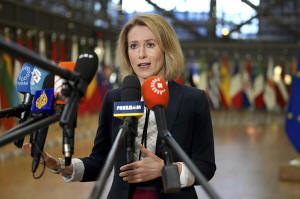|
The EU started to impose asset freezes and travel bans on Syrian
officials and organizations in 2011 in response to Bashar
Assad’s crackdown on protesters, which festered into a civil
war.
The 27-nation bloc targeted 316 people and 86 entities accused
of backing Syria’s former ruler. It is keen to lift those
measures if Syria’s new leaders set the country on the path to a
peaceful political future involving all minority groups and in
which extremism and former allies Russia and Iran have no place.
EU foreign policy chief Kaja Kallas said ministers had agreed on
a “roadmap” for easing sanctions. Speaking after chairing the
meeting, she said, the aim was to lift those measures “that are
most hindering the early buildup of the country and to move from
there.”
She underlined that the ministers had only reached “a political
agreement” - not one to start easing the measures immediately -
and that “there are also technical issues to be solved” in the
weeks ahead before any sanctions can be lifted.
Kallas said that an easing of sanctions “could give a boost to
the Syrian economy and help the country get back on its feet.”
But she added: “While we aim to move fast, we also are ready to
reverse the course if the situation worsens.”
The ministers favor on a “snap back” mechanism to reimpose
sanctions if they believe that Syria's new leaders are heading
in the wrong direction.
Dutch Foreign Minister Caspar Veldkamp said the aim would be to
lift restrictions on things like Syria’s infrastructure and
energy sector “so that the country can develop itself again.” He
said that “certain sanctions will stay in place, such as (on)
weapons exports.”
Since Damascus fell on Dec. 8 and Assad fled to Moscow, Syria’s
transition has appeared promising, but the new leadership has
yet to lay out a clear vision of how the country will be
governed.
The Islamic militant group Hayat Tahrir al-Sham, or HTS – a
former al-Qaida affiliate that the EU and U.N. consider to be a
terrorist organization – has established itself as Syria’s de
facto rulers after coordinating with the southern fighters
during the offensive late last year.
Veldkamp said that the restrictions on HTS itself would not be
eased initially. “They’re the new ones in power. We want to see
how their words are translated into actions,” he told reporters.
All contents © copyright 2025 Associated Press. All rights
reserved |
|




